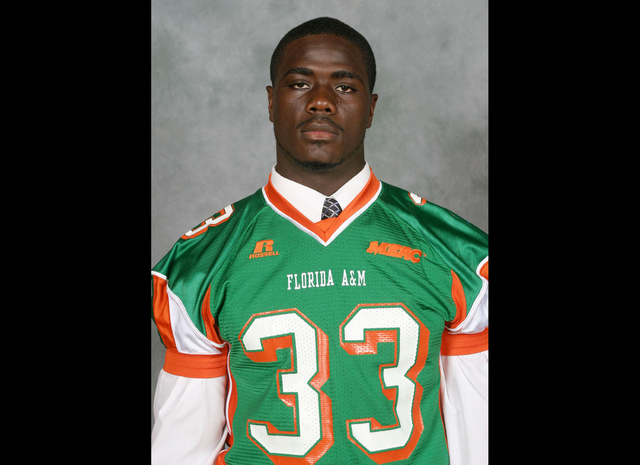Family of man shot 10 times by NC cop wants answers
CHARLOTTE, N.C. — An unarmed man seeking help after a car crash over the weekend was shot 10 times by the Charlotte police officer who’s now charged in his death, investigators said Monday.
The release of the information supporting the voluntary manslaughter charge came at the end of a day that also included the first public remarks by victim Jonathan A. Ferrell’s family. A family attorney and representatives of the NAACP questioned whether race played a role in the shooting of the black man by a white officer.
Ferrell’s family said the former Florida A&M University football player moved to Charlotte about a year ago to be with his fiancee and was working two jobs. He wanted to go back to school and eventually become an automotive engineer.
“You took a piece of my heart that I can never put back,” said Ferrell’s mother, Georgia Ferrell, as she clutched a stuffed Winnie the Pooh doll her 24-year-old son loved as a child.
A police news release said Officer Randall Kerrick fired 12 times at Ferrell early Saturday while responding to a breaking and entering call, hitting him 10 times. Kerrick was scheduled for a first court appearance Tuesday on the voluntary manslaughter charge.
NAACP leaders gathered Monday to both praise police for quickly filing charges and to complain about how the shooting didn’t surprise them considering portrayals of black men in popular culture and previous instances of racially inflected violence.
Ferrell family attorney Chris Chestnut wondered Monday what role race may have played in Saturday’s shooting.
“The officer is white, Mr. Ferrell is black. This might be more of a reflection of where we are as a country,” he said.
The encounter was set in motion around 2:30 a.m. Saturday when Ferrell’s car ran off the entrance road to a sprawling suburban neighborhood that was carved out of farmland about a decade ago some 15 miles from downtown Charlotte. A sign near the crash site advertises a neighborhood watch meeting in a few days.
After crashing his car into trees, Ferrell kicked out the back window and headed up a hill to the first set of closely-clustered houses he could see. He then started “banging on the door viciously” of a home to attract attention, Police Chief Rodney Monroe said.
The woman inside answered, thinking it was her husband coming home late from work. When she saw Ferrell, she shut the door and called police. Monroe said he didn’t think the unarmed Ferrell made threats.
Officers responding to the breaking and entering call found Ferrell on a road that only leads to the neighborhood’s pool. Ferrell ran toward the officers, who tried to stop him with a Taser. Police said he continued to run toward them when Kerrick shot him. Ferrell died at the scene.
Chestnut, who has spoken with police officials, said that Kerrick didn’t identify himself as a police officer.
A small pot of flowers and red balloons were placed on the spot. Orange spray paint was the only other indication of where Ferrell died.
Lance LoRusso, an attorney and former police officer, said it’s unusual for a police officer to be charged so quickly after a shooting. He said there is generally a waiting period while investigators review the evidence.
“There are a couple of reasons why police take their time. First of all it takes time to develop things like the toxicology report to determine what happened. You have to wait until daylight to reconstruct the crime scene. You have to interview all the people involved. And the officer is given the opportunity to decompress before making a statement,” he said.
Ferrell’s mother said Kerrick had no business being a police officer if he couldn’t react properly to a man who needed help.
“I truly forgive him. I pray for him. And I pray that he gets off the police force,” Georgia Ferrell said.
His family painted a picture of a bright man with an “infectious smile” who was always there for his brothers and sisters. “He was a role model,” said his brother, Frank. “He had so much love in his heart. And he was always concerned about his family.”
“He had dreams of being an automotive engineer. He wanted to design a car from the very last bolt to the interior,” his brother said.
He said he didn’t know where his brother was going that night, or why he got into the accident. But he said his brother had never been in trouble before.
Several people in the neighborhood where Ferrell went after the crash refused to talk to a reporter Monday. A Charlotte-Mecklenburg Police car was in one driveway just up the hill from Ferrell’s wreck. No one answered the door at that home.
Ferrell was at least the sixth person to be shot by Charlotte-Mecklenburg officers since the start of 2012. Four of them have died.
Charlotte police investigate their own officers involved in shootings. The State Bureau of Investigation can step in if requested, but they haven’t been asked to do so in any recent officer-involved shootings.
In the other shootings, prosecutors decided not to charge the officers involved and an independent panel of citizens that investigates the police ruled the shootings were justified.
The shooting needs to bring more scrutiny to the Citizens Review Board so the group simply doesn’t assume police officers are always right, said Kojo Nantambu, president of the Charlotte-Mecklenburg Branch of the National Association for the Advancement of Colored People.
“No police department is perfect,” Nantambu said. “But every time that group investigates, they find nothing wrong.”























